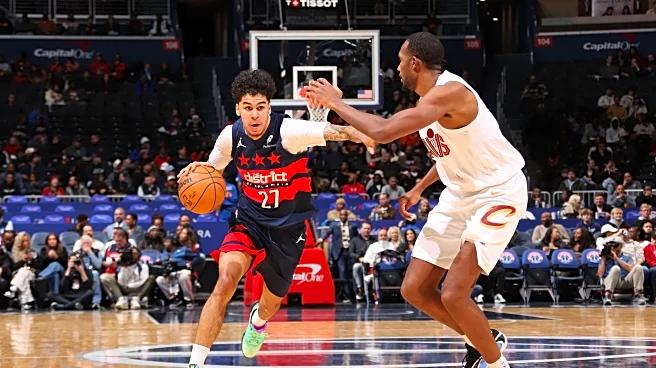What's Happening?
Baker Mayfield, quarterback for the Tampa Bay Buccaneers, has been candid about his approach to his NFL career, emphasizing authenticity and vulnerability. In a recent interview, Mayfield expressed that he does not have everything figured out and enjoys showing his true self, including his weaknesses. This openness was evident after the Buccaneers' recent victory over the New York Jets, where Mayfield admitted the win was personal due to past experiences with Jets defensive coordinator Steve Wilks. Mayfield's attitude contrasts with the typical guarded nature of professional athletes, as noted by former NFL quarterback Mark Sanchez.
Why It's Important?
Mayfield's approach to his career highlights a shift in how athletes interact with the media and fans, prioritizing transparency and relatability over traditional stoicism. This can influence public perception and fan engagement, as audiences may appreciate the honesty and vulnerability shown by athletes. Mayfield's attitude also reflects broader societal changes where authenticity is increasingly valued, potentially impacting how sports figures are marketed and perceived. His success on the field, coupled with his openness, may inspire other athletes to adopt similar approaches, fostering a more genuine connection with fans.
What's Next?
As the NFL season progresses, Mayfield's performance and attitude will continue to be scrutinized. The Buccaneers face challenging games ahead, including a matchup against the reigning champion Eagles. Mayfield's ability to maintain his authenticity in the face of adversity will be tested, and his approach may influence team dynamics and leadership styles within the Buccaneers. Additionally, his candidness could lead to more media attention and discussions about the role of vulnerability in professional sports.
Beyond the Headlines
Mayfield's openness may contribute to changing cultural norms within the NFL, where mental health and personal expression are becoming more prominent topics. His willingness to show vulnerability could encourage other players to speak openly about their experiences, potentially leading to a more supportive environment within the league. This shift could also impact how teams manage player well-being and address mental health issues, promoting a healthier and more inclusive sports culture.











